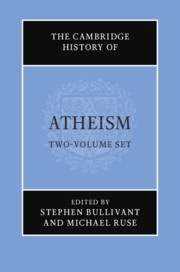Book contents
- The Cambridge History of Atheism
- The Cambridge History of Atheism
- Copyright page
- Dedication
- Contents
- Acknowledgments
- Contributors
- Introduction
- Part I Preliminaries
- Part II Atheisms in History
- Part III Reformation, Renaissance, Enlightenment
- Part IV Classical Modernity: Philosophical and Scientific Currents
- Part V Classical Modernity: Social and Political Currents
- 23 The French Revolution
- 24 Freethinkers, Atheists, and Anticlericals: Spanish American Struggles for Independence
- 25 Marx and Marxisms
- 26 Nineteenth-Century Russia
- 27 Secularism and Humanism
- 28 Bertrand Russell
- 29 Robert Ingersoll
- 30 Early Women’s Movement
- 31 Early African American Secularism
- Part VI Twentieth and Twenty-First Centuries: Intellectual and Artistic Currents
- Part VII Lived Atheism in the Twentieth- and Twenty-First Centuries: Case-Studies
- Part VIII Emerging Atheisms in the Twenty-First Century
- Part IX Conclusion
- Index
- References
31 - Early African American Secularism
from Part V - Classical Modernity: Social and Political Currents
Published online by Cambridge University Press: 25 September 2021
- The Cambridge History of Atheism
- The Cambridge History of Atheism
- Copyright page
- Dedication
- Contents
- Acknowledgments
- Contributors
- Introduction
- Part I Preliminaries
- Part II Atheisms in History
- Part III Reformation, Renaissance, Enlightenment
- Part IV Classical Modernity: Philosophical and Scientific Currents
- Part V Classical Modernity: Social and Political Currents
- 23 The French Revolution
- 24 Freethinkers, Atheists, and Anticlericals: Spanish American Struggles for Independence
- 25 Marx and Marxisms
- 26 Nineteenth-Century Russia
- 27 Secularism and Humanism
- 28 Bertrand Russell
- 29 Robert Ingersoll
- 30 Early Women’s Movement
- 31 Early African American Secularism
- Part VI Twentieth and Twenty-First Centuries: Intellectual and Artistic Currents
- Part VII Lived Atheism in the Twentieth- and Twenty-First Centuries: Case-Studies
- Part VIII Emerging Atheisms in the Twenty-First Century
- Part IX Conclusion
- Index
- References
Summary
In Frederick Douglass’ second autobiography, My Bondage and My Freedom, published in 1855, he notes that his religious views during the course of his life “pass[ed] over the whole scale and circle of belief and unbelief, from faith in the overruling Providence of God, to the blackest atheism” (Blassingame et al. 2003). Just three years earlier, in what is perhaps his most well-known speech, Douglass likewise noted that rather than embrace a pro-slavery gospel or a gospel indifferent to the institution of slavery, “I would say welcome infidelity! Welcome atheism! Welcome anything! In preference to the gospel, as preached by those Divines!” (Douglass 1852) While his 1852 speech, “What to the slave is the fourth of July,” is more well known for its harsh denunciations of American republicanism, his critique of Christian Churches and ministers occupies just as prominent a role and, when combined with insights from his autobiographies and other sources, marks him as one of the earliest black intellectuals to embrace secularism.
- Type
- Chapter
- Information
- The Cambridge History of Atheism , pp. 568 - 582Publisher: Cambridge University PressPrint publication year: 2021

